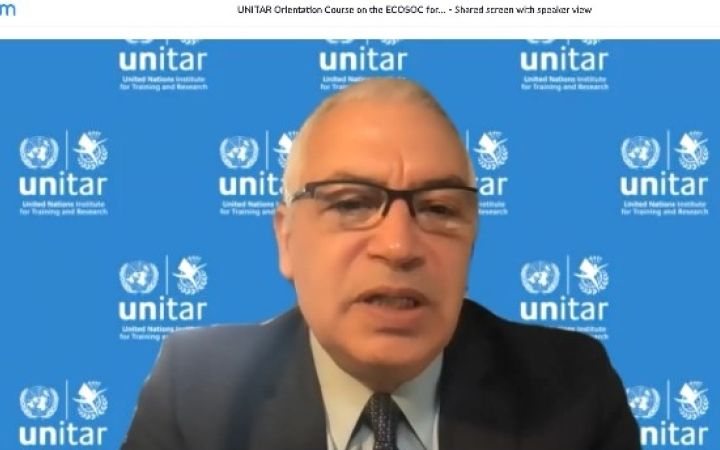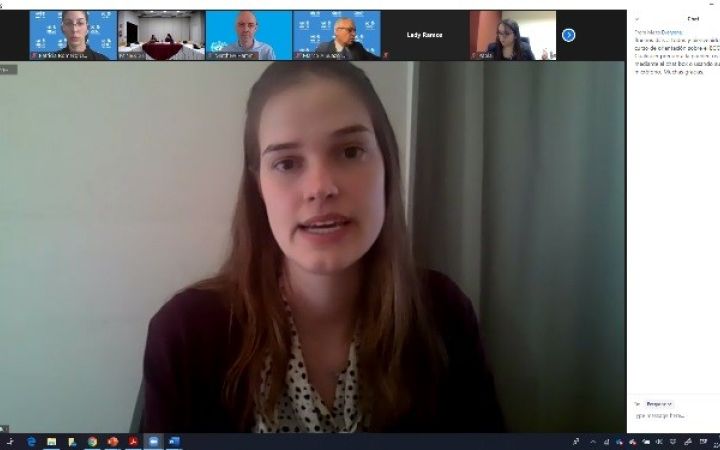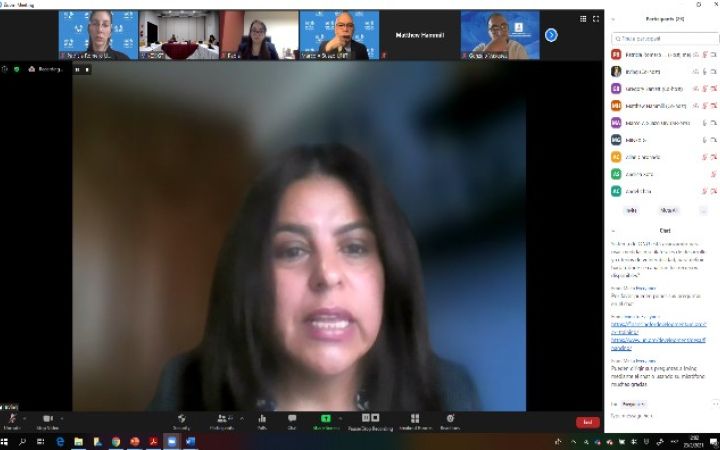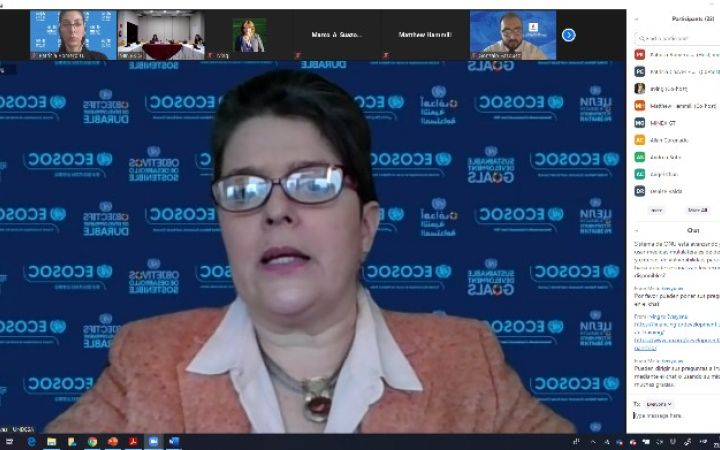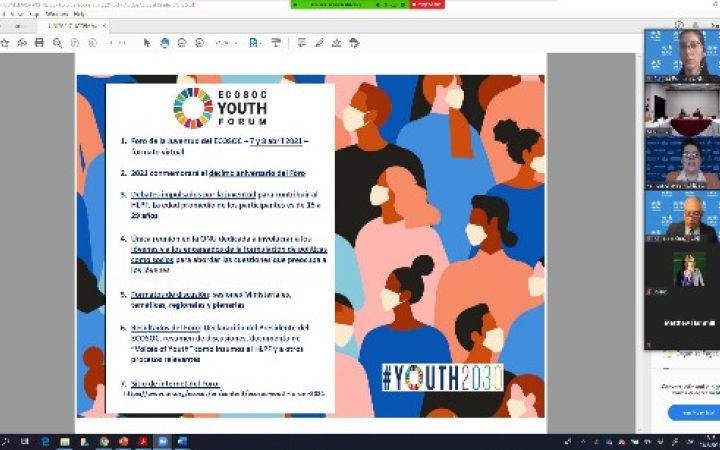23 February 2021, New York, USA and Guatemala City, Guatemala – The United Nations Institute for Training and Research New York Office (UNITAR NYO) hosted a course on the work of the ECOSOC, entitled “UNITAR Orientation Course of the ECOSOC for Guatemala Delegates” on 23 February 2021. As with the previous course held in January, this training took place in an online format, attracting over 20 delegates that participated from the Ministry of Foreign Affairs and the Permanent Mission of Guatemala in New York. The UNITAR New York office delivered a three-session online training to diplomats mostly working within the human rights, multilateral policy, international policy and cooperation fields, under the auspices of the Sweden programme entitled “Leveling the Playing Field”.
Mr. Marco Suazo, Head of UNITAR office in New York, opened the course with a warm welcome to participants and expressed his gratitude to the speakers for their participation and invited participants to interact. In addition, he mentioned that since ECOSOC is an important body that manages the development agenda and discusses humanitarian, operational, and organizational aspects, UNITAR is committed to supporting Guatemala during its journey as a member of the ECOSOC in any event focused on promoting the 2030 Agenda or the SDGs.
Mr. Suazo highlighted that the Guatemalan delegation has previously had different meetings with other experts and former ambassadors from Guatemala to reinforce their knowledge of ECOSOC. Therefore, this UNITAR course complemented their understanding on issues focused on the coordination of the UN System through ECOSOC and its operational activities segment, mobilization of financial and technological resources for the implementation of the 2030 Agenda, and how to strengthen alliances for development.
Mr. Suazo then passed the floor to Mr. Matthew Hammill and Ms. Martina Müller from the Operational Activities Policy Branch at UNDESA. They followed with highlights of the supervisory and coordinating role of ECOSOC and its work to advance sustainable development. They highlighted the importance of the Quadrennial Comprehensive Policy Review (QCPR) mechanism, the repositioning of the UN development system in the context of the QCPR, and the division of work between the General Assembly and ECOSOC on this issue.
Ms. Müller pointed that the QCPR is the only resolution that provides strategic guidance on all UN development work, being this a key vehicle for the GA to do three things regularly:
- Monitor and evaluate the efficiency, effectiveness, and impact of the UN operational activities for development.
- Establish policy guidelines for the entire system and modalities at the country level.
- Provide guidance on necessary adjustments in response to the development landscape and the development cooperation environment.
Ms. Müller and Mr. Hammill described the role of the General Assembly and ECOSOC in this whole process, and it is not nothing more than a shared responsibility. The ECOSOC is a platform for accountability and performance, in addition to providing guidance on the implementation of the resolution on QCPR. On the other hand, the General Assembly develops strategic policy guidelines and key operational modalities for the entire development system.
Following Ms. Muller and Hammill´s remarks, Mr. Suazo welcomed two speakers to engage in the course on the topic of Mobilizing Financing for Sustainable Development, namely, Ms. Irving Ojeda-Alvarez and Mr. Greg Barrett, both Economic Affairs Officers at International Tax and Development Cooperation Branch in UNDESA. They elaborated on the UN´s work on financing for development and the objectives of their presentations were based on:
- Provide an overview of the planned strategic engagement and policy integration activities of the Financing for Sustainable Development Office.
- Provide a brief description of ECOSOC's work in promoting the UN's unique role in international cooperation on tax matters, and,
- Identify training opportunities to increase delegates´ participation in the areas of work of ECOSOC.
Reflecting on the Financing for Development Forum, Ms. Ojeda-Alvarez noted that it is the only government process that leads to results and States´ involvement. She shared that developing countries are more vulnerable because of their limited fiscal space and their burden of external debts.
Ms. Ojeda-Alvarez stressed that the main goals of the Financing for Development Forum (12-15 April 2021) will focus on the participation of all Members to advance in promoting actions for recovery sustainability and the promotion of the exchange of experiences and initiatives to finance the SDGs.
In her remarks, she also emphasized that the SDG Investment Forum will take place on 13-14 April 2021. This will be a platform for interaction between countries and the private sector on the expansion of investments for sustainable development. It will also function as a platform for discussion on practical policies and regulations that shape a favorable environment for investment in the SDGs. In the second part of her intervention, Ms. Ojeda-Alvarez addressed the work of the International Cooperation Division on taxation and development, where issues such as taxation and domestic resource mobilization were addressed.
In the final part of the programme, Ms. Patricia Chaves, Senior Sustainable Development Officer at UNDESA, provided information on the different ways in which ECOSOC relates to various civil society actors and the instruments and mechanisms for the participation of these actors that are outside the governmental sphere.
Ms. Chaves mentioned two main instruments that ECOSOC has, which are the Committee on Non-Governmental Organizations and the Committee on Major Groups and Other Stakeholders:
- Committee on NGOs.- ECOSOC has a special mandate to involve different civil society actors into the UN discussions. ECOSOC is the only body to which the UN charter has given a specific mandate to establish the link between intergovernmental processes and the participation of non-governmental organizations of civil society. Ms. Chaves examined the processes to obtain consultative status with ECOSOC, as well as the benefits and opportunities NGOs have such as organizing side events, establishing contacts, and promoting their programmes.
- The other mechanism that ECOSOC has to allow civil society participation is connected with the participation of "major groups and other stakeholders". These groups are more involved in activities and meetings on sustainable development. Not all groups have consultative status with ECOSOC but participate with partners who coordinate their participation. It must be clear that these groups are not part of the UN or the Secretariat.
Ms. Chaves also covered aspects of the ECOSOC Youth Forum which is a very dynamic space and different from other forums. She highlighted that the Youth Forum has been developing for the last 10 years and meets annually. Young people contribute to policy debates and it provide an opportunity for them to address common challenges and make progress on the 2030 Agenda.
To conclude her session, she shared that the Youth Forum will take place on April 7 and 8 in virtual format and its debates are led by young people and for young people. They will focus on efforts to get out of the pandemic and promise different discussion formats that provide opportunities for the exchange of realities between young people with Member States. Ms. Chaves stressed that the results of the Forum will be a statement from the President of the ECOSOC, a summary of the debates, and a document entitled “Voices of Youth”.
Mr. Suazo then closed expressing his sincere gratitude to the Guatemala delegates and experts from the UN for their excellent participation and support to make this event possible.


